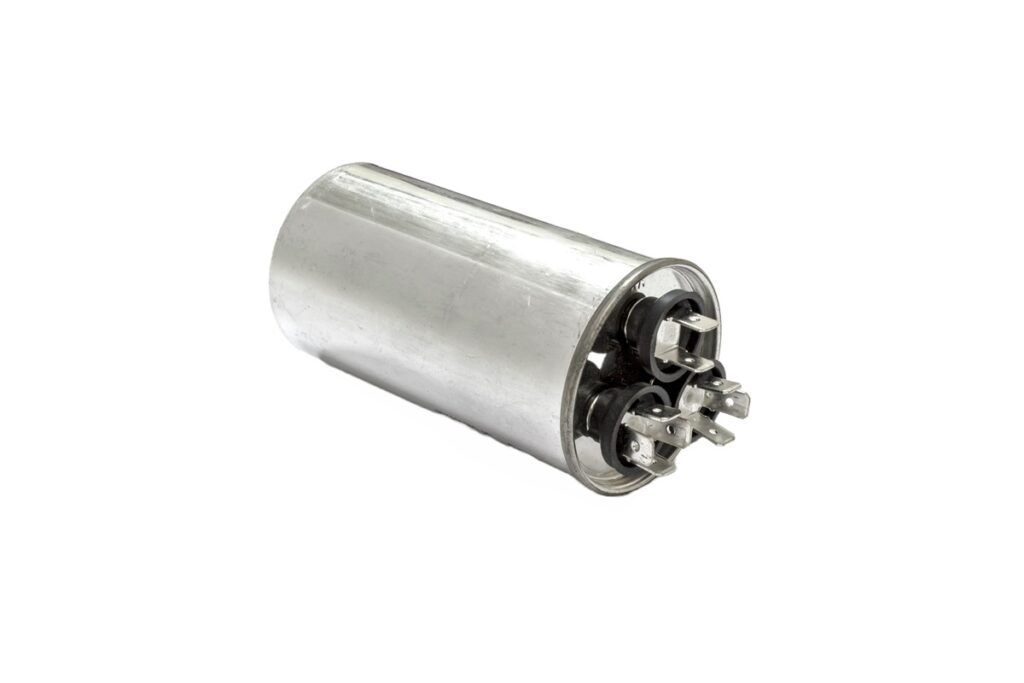How Long Do AC Capacitors Last
AC capacitors are essential air conditioner parts that help start an air conditioner’s heating and cooling processes. Knowing more about the lifespan of AC capacitors and their maintenance requirements can be essential when you’re trying to make your AC last as long as possible and avoid costly repairs.
In this article, we’ll answer the question, “How long do AC capacitors last?” and give you all the relevant information you need to ensure that both your AC capacitor and air conditioning unit last as long as possible.

What is an AC Capacitor and Its Role?
AC capacitors are relatively small compared to the rest of an air conditioning system, but they play a pivotal role in the function of these systems.
Their role is to store electrical charge which they can discharge to provide a surge of power and initiate the function of the AC unit. When your thermostat lets the AC know that it’s time to activate, it sends a signal to the capacitor which then creates an electrical surge and activates the compressor.
Why is this necessary? Well, the power running to your AC isn’t enough to power up the motor on its own. But, once the capacitor has started the motor with a burst of power, the regular power is sufficient to keep it running.
Generally, these components look like a simple cylinder with a few wires coming out of it. Colored bands around its circumference serve to show how much power it’s rated for.
Types of AC Capacitors
There are several different types of AC capacitors. When discussing the lifespan of an AC capacitor, it is important to note the differences between the various types as it may affect their lifespans.
Let’s take a closer look at the types of capacitors and how they differ:
Single Run – These capacitors are typically used for single motors, they’re available in round and oval shapes, and they have one microfarad rating with two non-polarized terminals.
They’re primarily used in indoor blower motors, and some condenser fan motors, though you may find them in older AC units where they’re used for both fans and compressors. They have either a 370V or 440V voltage rating.
Dual Run – These capacitors are used to run both the fan and the compressor, and are essential in systems like outdoor units, heat pumps, and condensers. They generally have two different microfarad ratings, one for the fan and another for the compressor.
They have three terminals with specified polarity connections, and you require the unit’s model number in order to buy the right compressor for your unit. They are typically round in shape, but some models may be oval.
Hard Start – These capacitors assist both the compressor and fan motor during air conditioning startup. They are different from run capacitors, though they also store energy to reduce strain on the electrical system. These capacitors may include a relay, and come with a range of different microfarad ratings and voltages.
Soft Start – These capacitors are similar to hard start capacitors. Instead of providing a surge of power on startup, they gradually increase power to the unit until it has enough power to initiate. They reduce current rushes, helping to minimize damage, and reduce the needed amount of power generated to start the system.
Average Lifespan of AC Capacitors
The life expectancy of an air conditioner capacitor is generally somewhere between ten and 20 years. However, this can vary significantly depending on the location.
For instance, in states like Arizona and Florida where temperature or humidity are extreme you may encounter a much lower AC capacitor lifespan. There are also many other significant factors that may affect your capacitor lifespan.
Factors Affecting Lifespan
Many different things affect the potential lifespan of your capacitor, for various reasons. These include the following:
- Climate conditions – In very hot climates, the AC capacitor lifespan may be reduced significantly compared to more mild climates.
- Usage frequency – The more regularly you switch the air conditioner on, the more use the capacitor gets. Units that get switched on regularly will likely have capacitors with shorter lifespans.
- Quality of the capacitor – Naturally, higher-quality capacitors will have longer than their lower-quality counterparts. The difference can be significant, with lower-quality capacitors having lifespans as short as half that of high-quality ones.
- Maintenance habits – As with most components, a well-maintained air conditioning system will have a longer-lived capacitor than one that rarely gets maintained. AC units that don’t receive regular maintenance have harder-working components that don’t function as well.
Signs of a Bad AC Capacitor
When an AC capacitor reaches the end of its lifespan, there are certain signs that you can pick up on. Here’s how to know if an AC capacitor is bad:
- The AC unit is not cooling efficiently – When the capacitor isn’t working properly, then the AC unit is unlikely to work as well, leading to less efficient cooling.
- You hear strange noises coming from the unit -A faulty capacitor can lead to unusual or excessive noise production.
- You experience increased energy bills – When your capacitor isn’t functioning well, it can’t store and release energy as it should. This leads to an increase in energy bills.
- The AC unit struggles to start or randomly shuts off – Sometimes, when an AC capacitor has failed, it may also result in the AC unit struggling to start, or switching off at random.
If you experience some or all of these problems, it’s a good idea to get someone to check your AC, and pay for AC repairs if necessary. Replacing a capacitor is considerably more affordable than replacing the entire unit.
What Happens When an AC Capacitor Fails?
While having an AC capacitor fail sounds bad, it can be difficult to understand what’s taking place when it happens. Here’s what happens when a capacitor fails.
- The air conditioning unit becomes less efficient.
- More energy is required in order to make the air conditioning unit function as needed.
- Additional strain is placed on the other air conditioning components.
- Overall it can lead to abject failure of the entire air conditioning system as everything has to work harder and the cooling system becomes less efficient.
- There may be insufficient power to start the fan or compressor, and there may be power surges through the system.
In short, a failed air conditioning capacitor can lead to various system failures including overall system failure.
Why Do AC Capacitors Fail Prematurely?
If you’ve had to replace the same AC capacitor multiple times, or you find that your AC capacitor keeps going out, there are a few root causes that may be to blame.
If you experience power surges regularly, it can damage this kind of component. The same is true if you’ve installed an incorrect capacitor type or size.
Not performing regular maintenance may also lead to system strain, as will exposure to high temperatures.
Performing checkups and maintenance every six months can help to extend the lifespan of your capacitor. It’s also a good idea to ensure that an appropriate capacitor is installed in the system, and that the room the AC is in is well-insulated, to help maintain cooler temperatures.
How Many Capacitors are in an AC Unit?
Most AC units have either one or two capacitors, though the number may increase in larger units. Mainly, it depends on how many components in the unit require more startup power than is provided by a standard power feed.
How to Test or Replace an AC Capacitor
In basic home AC units, you can easily test your capacitors with a few tools. We do not recommend doing this with large, or more complex systems, as it can be risky.
With any air conditioning system, it’s always better to call in a professional, unless you have 100%surety that you know what you’re doing.
Here’s how to test a capacitor:
- Open the AC unit
- Identify the capacitor
- Use a multimeter (set to the capacitance setting provided by the manufacturer) to test the capacitor by touching the probes to the capacitor’s terminals.
- If the reading is more than 10% outside of the capacitance range, your AC’s capacitor is faulty and needs to be replaced.
How to Prolong the Lifespan of Your AC Capacitor
There are a few steps that you can take to prolong the lifespan of your capacitor. These include the following:
- Clean, inspect, test, and maintain the capacitor regularly.
- Try to find a more balanced thermostat temperature that will keep the room cooler without causing the air conditioner to start running as regularly.
- Ensure that the AC system has consistently good ventilation.
- Install surge protectors to protect the AC unit from power surges.
- Schedule seasonal AC maintenance.
- Regularly clean the external components of your AC unit and replace air filters once or twice a year.
- Inspect and replace the refrigerant as needed.
Conclusion
Now that you know how to tell if an AC capacitor is bad, what the expected lifespan of these components is, and how important they are, you’re ready to do basic self-diagnosis on your AC unit.
If you know or suspect that your AC capacitor has failed, it’s probably a good idea to call in a professional AC repair team. They can help ensure that your AC gets back up and running without voiding the warranty or risking unsafe repairs.
FAQs
How long should an AC capacitor last?
Generally, the AC capacitor lifespan should be a minimum of five years and as many as 20. Factors like climate, capacitor quality, and others like these may affect how long a capacitor lasts.
How often should I check my AC capacitor?
You should check your AC for capacitor-related problems every six to 12 months. AC capacitors don’t have an expiry date, and their lifespans vary significantly based on operating conditions. Checking them regularly can save time and expense later on.
Can I replace my AC capacitor myself?
No, you should leave it to the professionals. Replacing a capacitor can be fairly hazardous, and isn’t something that should be attempted lightly or without sufficient training.
